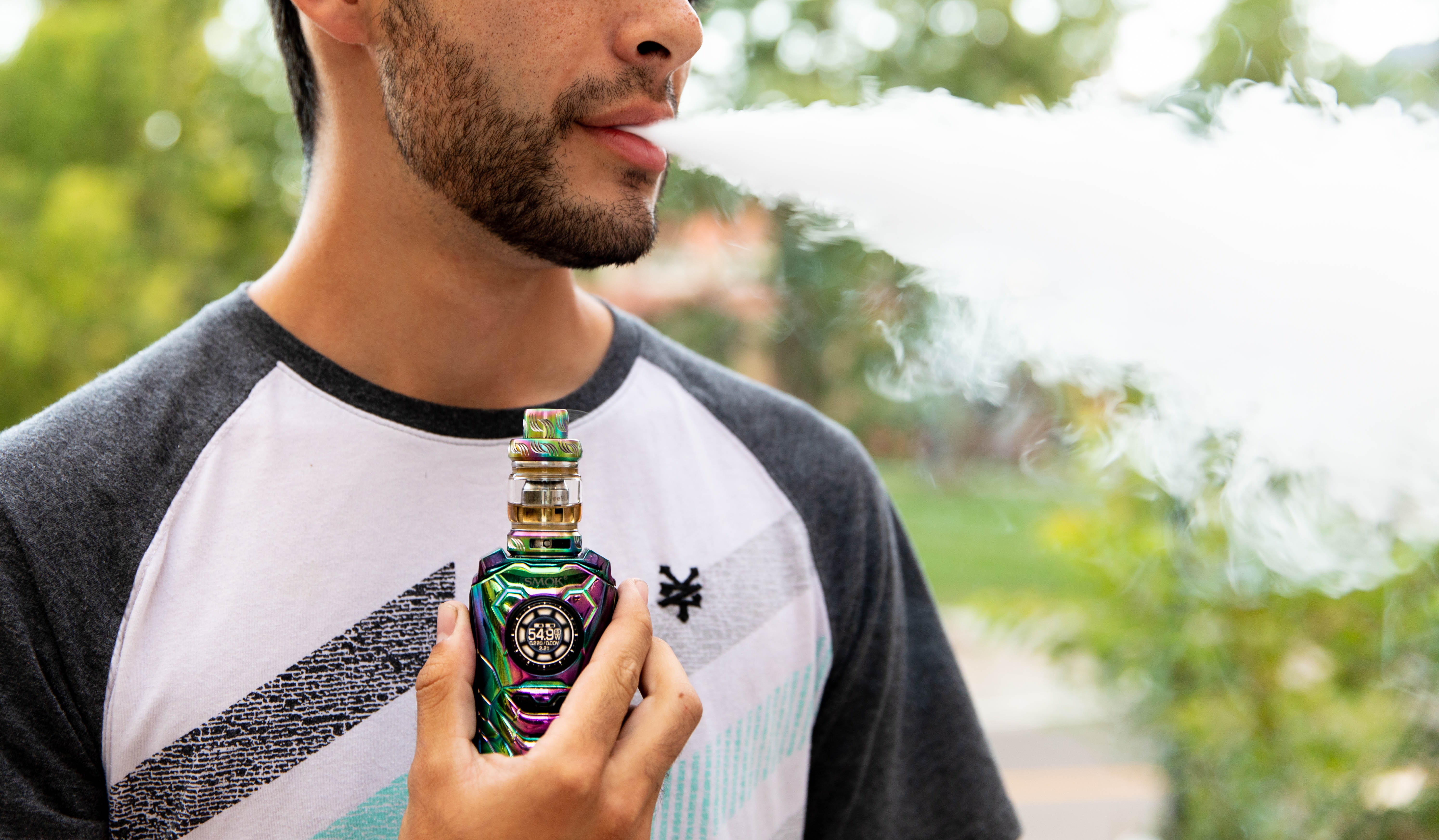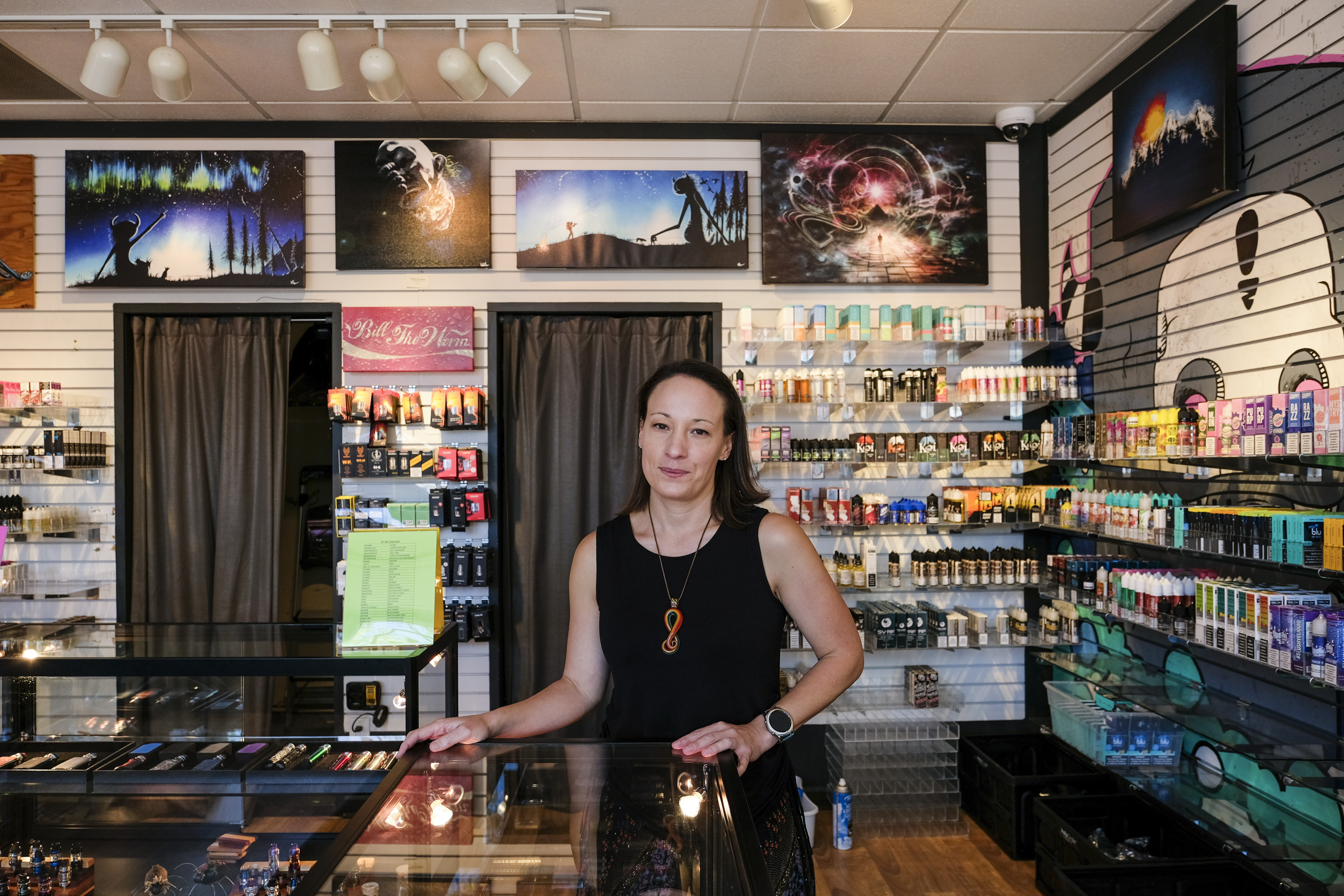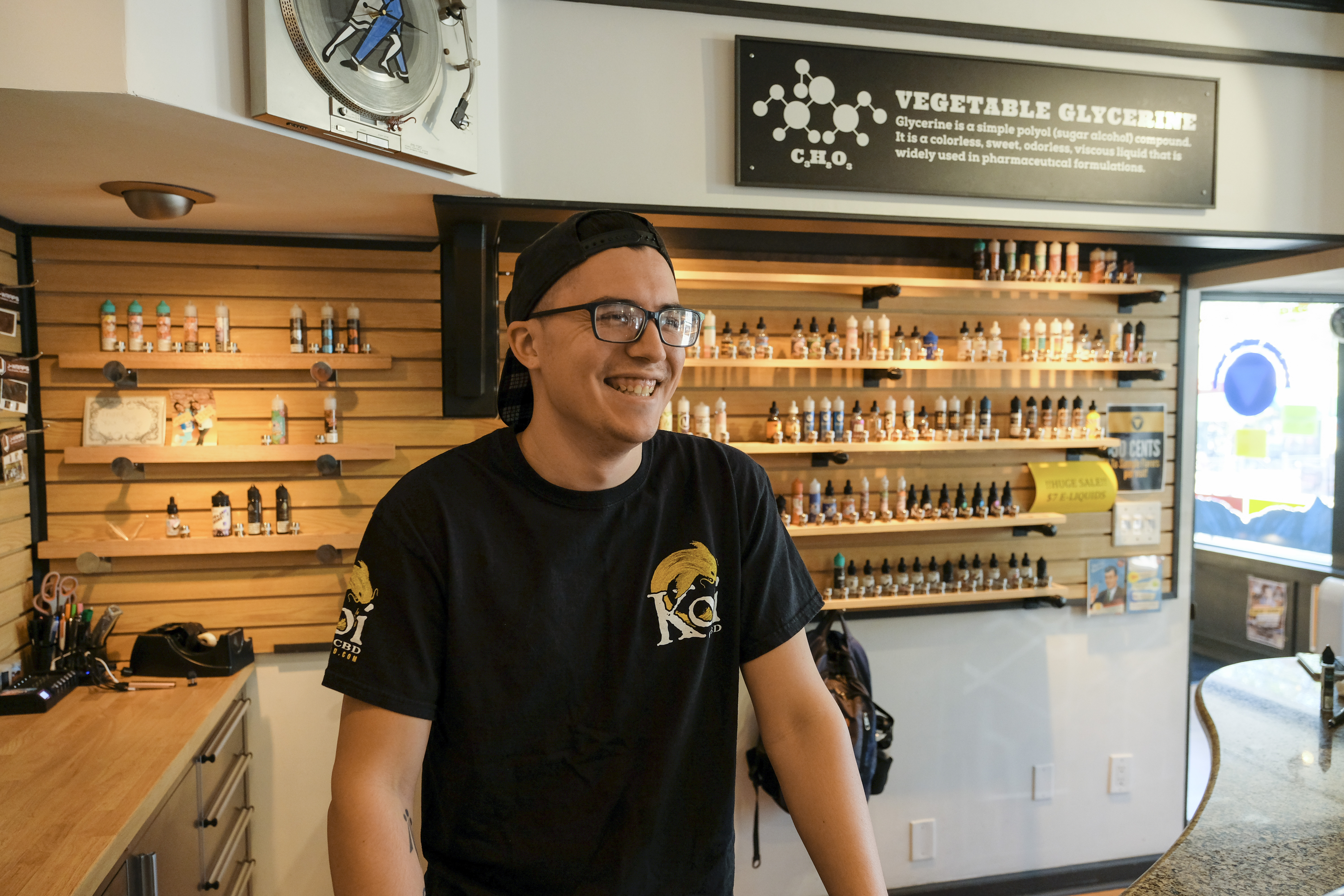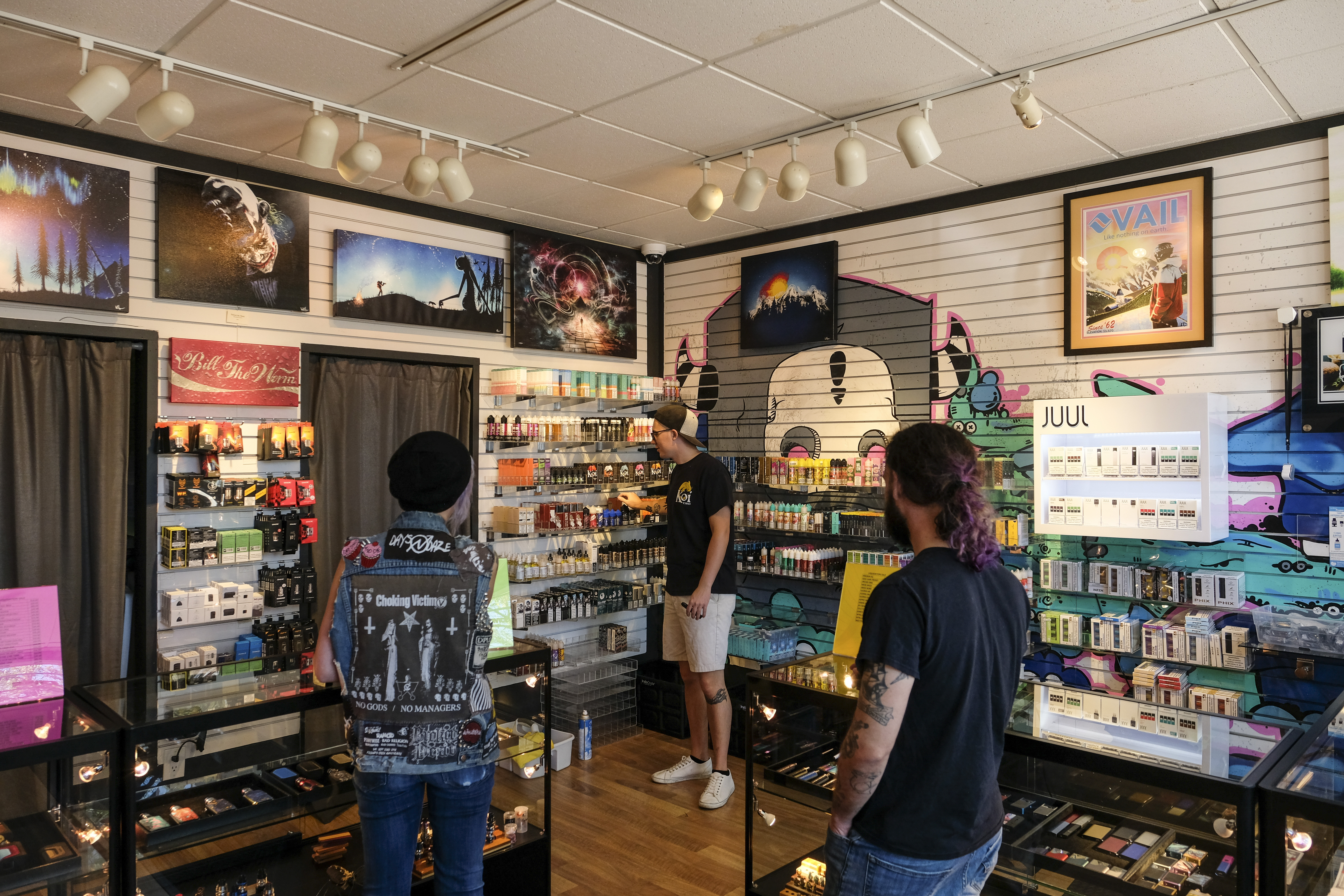
Xander Kahn blows out a cloud of vapor from his mod. Sept. 25, 2019. (Casey Paul/CU Independent)
Xander Kahn uses vape products for what he calls “the right reasons.” Looking to end his cigarette addiction, Khan switched at the age of 16 to other nicotine devices, opting for flavored liquids delivered through a battery-powered “mod.” Now a 20-year-old junior at the University of Colorado Boulder, Khan is a daily vape user.
“I had originally started with higher concentrations of nicotine in the juice and I’ve been able to work my way down to six-milligram(s),” Khan said. “I’ve been looking to go down to three and then to zero and then to stop altogether. And that’s kind of why the mod industry got started. It’s really just to have you wean off of it and use less and less nicotine until you’re at the point where you’re just doing the mouth motions.”
New laws in the City of Boulder spell major changes for users and the industry. On Sept. 17, Boulder City Council formally approved a ban on all sales of flavored vaporized products and raised the legal age to buy nicotine and tobacco to 21. Council also approved a 40 percent sales tax on all remaining legal vape products, to be placed on the Nov. 5 ballot.
It’s a move that Khan said he did not see coming, at least not in Boulder.
“I thought it was just going to be a lot more regulation within the industry itself, kind of like where the weed industry is going,” Khan said. “I was surprised to see it was just a cut-off ban.”
For people looking to wean off cigarettes by using flavored products, Khan said the decision is unfair. While vaping comes with a host of risks and health effects, for Khan and other users, particularly nicotine addicts, it still gives them a better alternative.
“(The city is) taking away our own freedom and choice to be able to say, ‘I realize I’m still addicted to nicotine, however, I don’t want to go back to known cancer-causing cigarettes,'” Khan said. “So, I feel like they’re kind of taking away that choice from us to do a safer alternative. Maybe not completely safe, but safer.”

Xander Khan, who at the age of 16 switched to vaping to curb his cigarette addiction, blows a cloud of smoke. Sept. 25, 2019. (Casey Paul/CU Independent)
Taylor Turbyne, a CU junior, turned to Juul after “bumming cigarettes” from people during the summer. The USB-like device has been the subject of national scrutiny due to its alleged predatory marketing towards younger people and its high nicotine concentration. One pod is roughly equal to the same amount of nicotine in a packet of cigarettes.
Turbyne feels the company has only hurt the vape industry’s image.
“I think it absolutely had a negative impact because Juuls were targeted to kids,” Turbyne said. But Boulder’s ban extends to many other vaporized products, and Turbyne worries a ban could lead users back down the path of cigarettes.
“I think (the ban) is silly to say the least,” Turbyne said. “Young kids, they’re already addicted to nicotine. So, with the ban, they’re just gonna turn to cigarettes. I’m gonna try to cut out nicotine altogether. I think that cigarettes are a bad path, but that’s the position that Boulder’s putting people in.”
Propelled by continuing reports of vape related deaths, the Trump administration has announced plans to implement a country-wide ban of all flavored vaporized products. But both Khan and Turbyne feel the apparent crisis has become sensationalized.
“I feel like a lot of the headlines were clickbait,” Khan said. “Yes, the deaths actually occurred, and it’s an actual serious thing that we should be looking into. And we have really only scratched the surface of it because it’s so recent.”
Industry regulation should have been the alternative to a ban, said one local business owner. Now, because of Boulder’s decision, her shop faces closure.
Ginger Tanner has owned the Boulder Vape House for over six years. Her husband, Sean, had been addicted to cigarettes since high school and found success in quitting by moving to flavored vape products. Now, the couple run their business to give nicotine users a choice outside of cigarettes.
“When (Sean) ended up seeing that transition in his life, he found an opportunity to help other people,” Tanner said. But following the city’s decision to clamp down on products, Tanner said her shop will be closing by the end of October. In 2018, around 97 percent of Boulder Vape Houses’ sales came from flavored e-liquid products.
“It’s heartbreaking,” Tanner said. “We have seen thousands of people convert from smoking cigarettes to using vapor products to never coming in any longer because they’re no longer vaping even. As an industry that is not big tobacco, and is disrupting big tobacco, (the ban) is absolutely mind-blowing.”
Tanner hoped the city would have opted for stricter regulations for both the vape industry and legal sellers. She supports raising the buying age to 21, which she agrees would help remove the teen demographic who have access to products much like liquor stores and dispensaries.
“You’re putting regulations on businesses like ours, but there is not regulation that is going to change for cigarettes,” Tanner said. “Why are we being subjected to more scrutiny than alcohol (or) marijuana?”
Boulder’s decision came after pressure from area parents, many of who have children in Boulder Valley School District (BVSD) and were alarmed at the growing rate of teen vape use. Around 33 percent of BVSD students admitted to consuming tobacco vapor and Full Spectrum CBD Vape Juice exceeding the Colorado average of 26.2 percent. The national average is even lower at 13.2 percent.

Ginger Tanner stands in her shop, Boulder Vapor House. Tanner and her husband, Sean, say they have no choice but to close their shop following the city’s ban. Sept. 19, 2019. (Ryan Corbett/CU Independent)
Tanner has a 14-year-old daughter of her own and though she has been surround by a vaping environment most of her life, Tanner said she and her husband have been “proactive” about educating her about the risks.
“It’s the parents’ role to parent their children,” Tanner said. “She understands ‘you’re going to be an adult when you’re an adult.’ If she was caught vaping or using drugs or alcohol, there would be consequences.”
Tanner also felt that the introduction of Juul opened a Pandora’s Box for the industry. She was hesitant at first to stock the product, which at the time contained more nicotine than anything else on the market. But she and her husband needed to keep up with demand, so like many other sellers, they carried it.
As for cigarette rates, Tanner believes they may soar as a result of the ban.
“It is very sad to have customers come in and hear, ‘what does Boulder want me to do? Go back to smoking cigarettes?’” Tanner said. “I hear it every day.” She added that despite media headlines of vape-related deaths, it is incomparable to cigarettes.
480,000 people die annually in the U.S. due to lung cancer from cigarette use. Currently, there have been 11 reported vape related deaths, though hundreds have been hospitalized. Still, Tanner asks, “how is that even a comparable factor?”
Ultimately, her closure is a blow to the community, Tanner said. She and her husband have spearheaded the Hill Block Party for the past several years, an event meant to give back to the community.
“We’ve always donated our own money into the community of this event, providing thousands upon thousands of dollars,” Tanner said. “The event was always focused on our community awareness, getting college students involved with the community up here. It has never been about our business, but trying to get people to acknowledge that the Hill is a district that they can come and hang out for food, retail and entertainment.”
With Boulder Vape House gone, Tanner said the event will cease to exist.
Dylan Sylvest, shift lead at Boulder Vapor House, vapes for his own mental health. Following three concussions that led to nerve damage, Slyvest relies on nicotine to raise his dopamine levels and lessen pain. He also has hypomania, a condition of persistent mood elevation, and he said vaping keeps him “from bouncing off the walls.”
He has vaped regularly for six years, and with the ban in Boulder, he has had no choice but to “stock up” on flavored products.
“I thought I had a life in the nicotine industry … but if everything’s going away, I don’t know anymore,” Sylvest said.
Getting out of Boulder is one thing, but should a national ban be put in place, Sylvest said he “doesn’t know what he’ll do.”

Dylan Sylvest has vaped for six years. He uses nicotine to lessen the pain of nerve damage due to his three concussions. With Boulder’s ban, Sylvest has stocked up on flavored e-liquids, doing everything possible to avoid cigarettes. Sept. 19, 2019. (Ryan Corbett/CU Independent)
He blames the Food and Drug Administration for letting vape-related issues slide until it ultimately snowballed into both local and national outcry. Like Tanner, Sylvest wished there had been more regulation by the department instead of cities like Boulder choosing a ban.
“Nobody wants to put in the time and research to know what actually works,” Sylvest said. “They just want to ban it and say ‘now that’s something I don’t have to worry about anymore.’”
Sylvest intends to do everything possible to avoid cigarettes. He and Tanner see the industry that they are in as a combat to big tobacco.
“Go back to cigarettes, that’s what you are being told,” Sylvest said. “At least we are giving you a chance (to quit cigarettes).”
As for the 40 percent sales tax set to appear on the November ballot, Sylvest said with businesses like Boulder Vapor House closing, a tax won’t be much help for the community.
“40 percent of 0 is 0,” Sylvest said. He added that vaping is already expensive enough, with the mods he uses costing around $100. The average price for a pack of cigarettes in Colorado is $5.65.
“Vaping’s dead,” Sylvest said.
“Smoking’s back,” Tanner added.
Bonnie Dahl, owner of head shop The Fitter, called the 40 percent tax the “nail in the coffin” for e-liquid products, and she expects it will be popular with most Boulder residents.
“The big issue regarding all these new regulations in the city of Boulder is the fact that all the neighboring cities will then get the business and sales tax revenue,” Dahl said. “It also will probably create a new black market in Boulder.”
The rise of a black market is likely, according to Boulder Mayor Pro Tem Sam Weaver.
“It would be the natural response,” Weaver said. “We expect that other cities in Boulder County will be behind us so a black market will be harder and harder to materialize.”
Dahl said Juul’s increased marketing ultimately led to the backlash. She said she has seen her sales of Juuls drop as customers move towards products that allow them to exhale CBD or essential oils.

Customers inside the Boulder Vapor House on University Hill. With the business closing, its owner says the annual community Hill Block Party will cease to exist. Sept. 19, 2019. (Ryan Corbett/CU Independent)
“The end result is that (Juul) addicted a whole new generation of young people who never had intentions to use nicotine and were never cigarette smokers,” Dahl said. “We know (the ban) will affect our business revenue, but it now seems very inevitable that this is not just a Boulder movement, but much larger at the national level.”
According to Weaver, the industry is a “free-for-all” when it comes to licensed sellers of e-liquid products. He said the closure of businesses like Boulder Vapor House was “collateral damage.”
“We did not intend to shut anyone down,” Weaver said. “Decisions that representatives have to make will have some winners and some losers.”
Joelle Rossback, the mother of a high school freshman and member of “Advocates for Clean Teens,” is a winner in that game.
“We’re responsible for (the ban),” Rossback said. “Our group came to be just from hearing from our kids in the district, in particular, Boulder High, (about) how rampant the vaping is. They see it in the locker rooms, they see it in the bathrooms, they see it in the classrooms. And I will tell you that my daughter in middle school was offered vaping products.”
Rossback said she believes the ban will help curb teen vaping. To those who rely on it to quit cigarettes, Rossback said, “it’s moving from one addiction to another.”
“(Vaping is a) worse addiction because the nicotine is so incredibly addictive,” Rossback said. “The suggestion would be to use FDA-regulated products like nicotine patches, nicotine gum and things like those.”
Still, Rossback said, “sadly, I do think that some will end up going in the direction of cigarettes.”
“I think this is more about preventing more kids from getting addicted,” she added.
As for a national ban, Rossback called it a step in the right direction. She said cigarettes still need to be reigned in but called vaping an “emergency” that needs immediate action. As for an alternative to Boulder’s ban, Rossback said there is nothing else that could have been done.
“Let’s be real, the adults can order online, they can go drive 10 miles or five miles or whatever it is, they can get what they need,” Rossback said.
Boulder Mayor Suzanne Jones said the decision was not easy for city council, which was “very concerned about the impact on local business but had to prioritize public health concerns.”
“We are sympathetic to businesses that are quite responsible,” Jones said. “But then there are a whole number of businesses that were clearly not being responsible and selling these products to underage users.”
She said she recognizes that some people have turned to vaping as an alternative to smoking cigarettes, but called the fear that the ban will turn people to big tobacco an “argument that industry people” brought to the city.
“I think that the bigger problem is keeping younger people from getting addicted to nicotine in the first place,” Jones said. “We should learn from history around the tobacco industry and how it promoted deliberately and misleadingly that tobacco was safe and then fought regulations while people died from lung disease. We need to not repeat that cycle with the latest generation of nicotine delivery devices.
“Public health and taking care of youth is job number one.”
Contact CU Independent Editor-in-Chief Robert Tann at robert.tann@colorado.edu.
Contact CU Independent Managing Editor Hannah Metzger at hannah.metzger@colorado.edu.
Contact CU Senior News Editor Anna Haynes at anna.haynes@colorado.edu.
Contact CU Independent Staff Writer Julia-Rose Kibben at julia-rose.kibben@colorado.edu.
